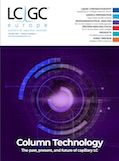Analytica 2020
The International Trade Fair for Laboratory Technology, Analysis, Biotechnology and Analytica Conference 2020 will take place in the International Congress Center (ICM), Munich, Germany, from 31 March to 3 April 2020.
Image Credit: f11photo/stock.adobe.com

The International Trade Fair for Laboratory Technology, Analysis, Biotechnology and Analytica Conference 2020 will take place in the International Congress Center (ICM), Munich, Germany, from 31 March to 3 April 2020.
From doping control to the detection of antibiotic-resistant germs to artificial intelligence (AI) in the laboratory, the Analytica conference reflects the entire spectrum of modern analysis. Attention increasingly rests on digitization in analytical disciplines: What do materials scientists use artificial intelligence methods for? How do physicians handle the increasing flood of data? What digital techniques can be used to optimize the monitoring of industrial processes? These and many other questions are being discussed by renowned researchers from around the world at the Analytica conference.
In addition to the overarching focus on digitalization, the conference agenda covers a wide range of current topics. The subject of doping control will be prominent with the Summer Olympic Games in Tokyo on the horizon. The wide variety of performance-enhancing substances-ranging from small inorganic substances to large biomolecules-are constantly changing and analytical techniques are in a constant race to keep up, making doping an exciting topic to cover.
The basis of the Analytica conference continues to be the numerous new developments in instrumental analysis. Thus, there are dedicated sessions on chromatography and mass spectrometry, spectroscopy, microscopy, and electroanalysis covering recent advancements and what the future holds for those techniques. A further session has been organized jointly by the “Pharmaceutical and Chemical Group” from Merck and the diagnostics company Immundiagnostik and will feature a series of lectures on biotechnologically produced active pharmaceutical ingredients. The importance of analysis for the pharmaceutical and healthcare sector is a major topic of interest at Analytica.
The multifaceted programme, organized by the Association of German Chemists (Gesellschaft Deutscher Chemiker, GDCh), the Society for Biochemistry and Molecular Biology (Gesellschaft für Biochemie und Molekularbiologie, GBM), and the German Society for Clinical Chemistry and Laboratory Medicine (Deutsche Gesellschaft für Klinische Chemie und Laboratoriumsmedizin, DGKL), invites you to look beyond your own horizons and let yourself be inspired by colleagues from other analytical disciplines.
The Analytica conference offers a great opportunity to exchange experience with your peers-and in the age of digitization and digitalization, this is more important than ever. Despite the many digital techniques and extremely helpful methods of AI, the knowledge, inventiveness, and, last but not least, intuition of experienced analysts will remain irreplaceable in the future. The challenge is to combine human expertise with the capabilities of machines. At the Analytica conference in Munich from 31 March to 3 April 2020, visitors can learn how this is already being done today and what opportunities this will open up for the analysis of tomorrow.
The Analytica conference takes place in the ICM in the immediate vicinity of the exhibition halls and is free for all Analytica visitors. For more information, please visit www.analytica.de/conference

Determining Enhanced Sensitivity to Odors due to Anxiety-Associated Chemosignals with GC
May 8th 2025Based on their hypothesis that smelling anxiety chemosignals can, like visual anxiety induction, lead to an increase in odor sensitivity, a joint study between the University of Erlangen-Nuremberg (Erlangen, Germany) and the Fraunhofer Institute for Process Engineering and Packaging (Freising, Germany) combined behavioral experiments, odor profile analysis by a trained panel, and instrumental analysis of odorants (gas chromatography-olfactometry) and volatiles (gas chromatography-mass spectrometry).
Investigating 3D-Printable Stationary Phases in Liquid Chromatography
May 7th 20253D printing technology has potential in chromatography, but a major challenge is developing materials with both high porosity and robust mechanical properties. Recently, scientists compared the separation performances of eight different 3D printable stationary phases.
Detecting Hyper-Fast Chromatographic Peaks Using Ion Mobility Spectrometry
May 6th 2025Ion mobility spectrometers can detect trace compounds quickly, though they can face various issues with detecting certain peaks. University of Hannover scientists created a new system for resolving hyper-fast gas chromatography (GC) peaks.

.png&w=3840&q=75)

.png&w=3840&q=75)



.png&w=3840&q=75)



.png&w=3840&q=75)









